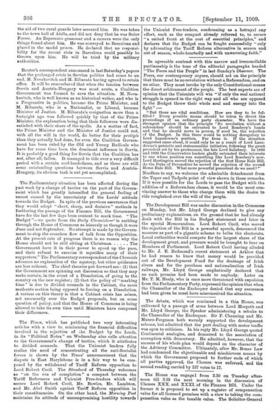In agreeable contrast with this narrow and irreconcilable partisanship is
the tone of the editorial paragraphs headed " The Peers and the People" in last Sunday's Observer. The
Peers, our contemporary argues, should act on the principle that there must be no revolution without a Referendum, and on no other. They must invoke by the only Constitutional means the direct arbitrament of the people. The best experts are of opinion that the Unionists will win "if only the real national struggle is opened in the right way and all who are opposed to the Budget throw their whole soul and energy into the fight"
"But there are vital conditions. How are they to be ful- filled Every possible means should be taken to divest the proceedings of an ordinary party character. We have the strongest opinion that the principle No revolution without a. referendum should be entrusted to Lord Rosebery's hands and that he should move in person, if need be, the rejection of the Budget. In this there would be nothing derogatory to Lord Lansdowne's position. Far from it. If the situation suggested came about, it could only be as a result of Lord Lans- downe's patriotic and statesmanlike initiative, following the great precedent set by his predecessor, the late Lord Salisbury. In 1886 and 1893 the Conservative leaders gladly entrusted their interests to one whose position was something like Lord Rosebery's now. Lord Hartington moved the rejection of the first Home Rule Bill. As the Duke of Devonshire he moved the rejection of the second Home Rule Bill. What more powerful precedent do we need?"'
Needless to say, we welcome the admirable detachment from the Taper and Tadpole point of view shown in these remarks.
If it were possible for the Lords to pass the Budget with the
addition of a Referendum clause, it would be the most con- vincing answer to those who charge them with the desire to ride roughshod over the will of the people.






































 Previous page
Previous page